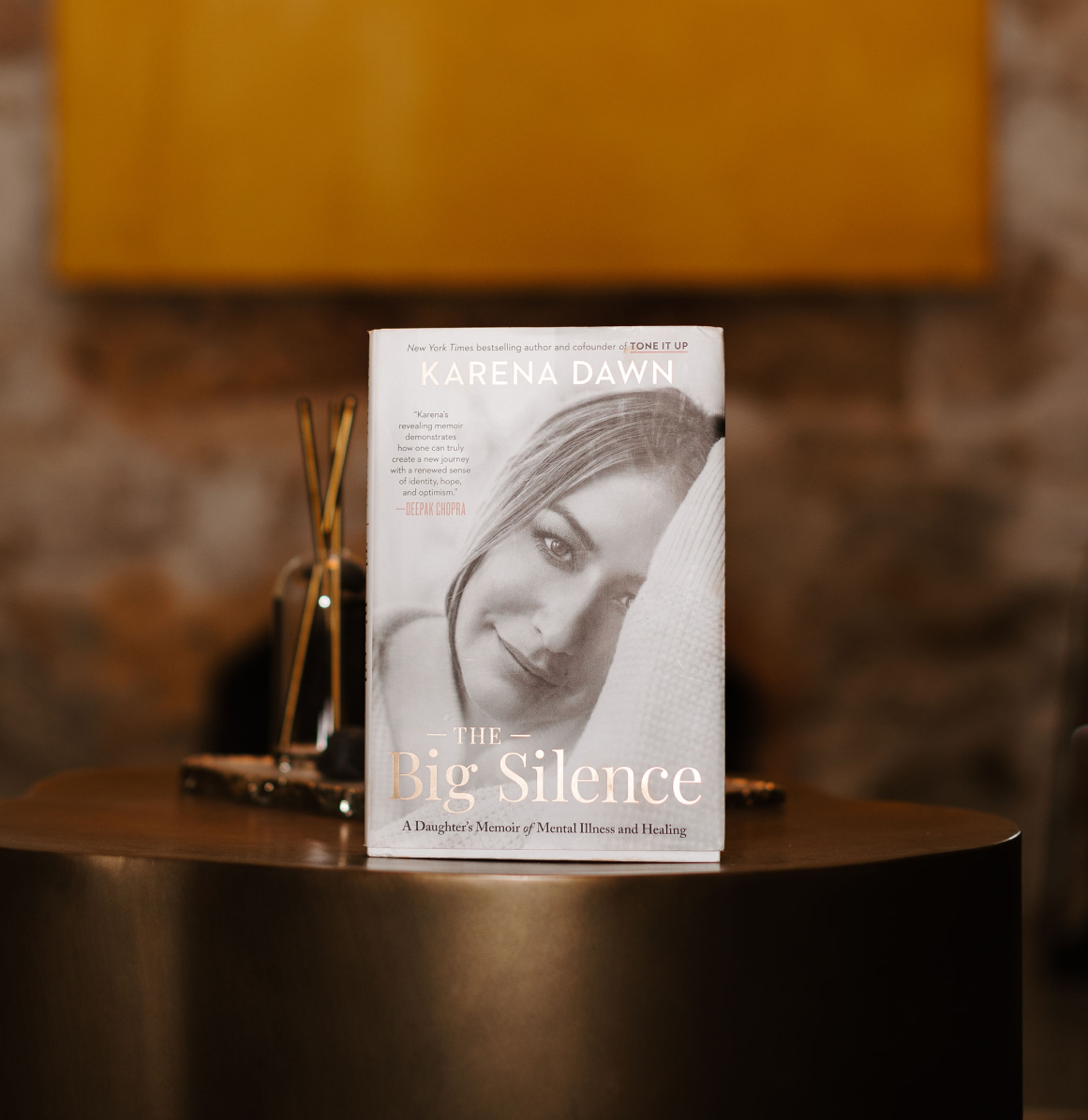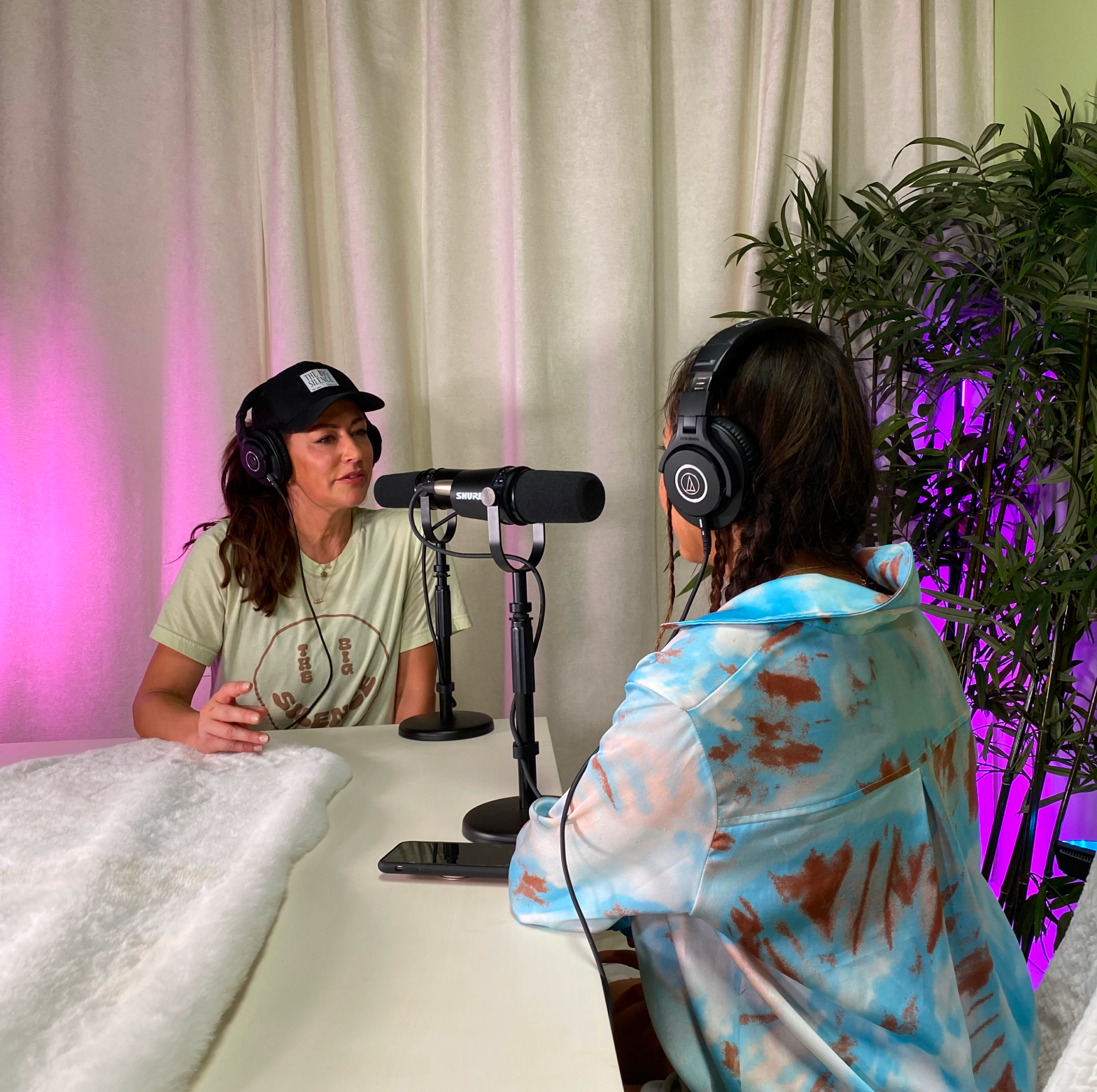
“No more embarrassment, no more shame, only healing.” - Karena Dawn, The Big Silence
February is International Boost Self Esteem month, and that seems like something to celebrate! It can be so easy to get caught up in everyday life, and not realize that you might be putting yourself down, or not being mindful of your self-talk and self-care. We are here to take a moment to inspire more confidence and boost self-esteem everyday with tips and tools from The Big Silence.
How Does Self-Esteem Impact Your Mental Health?
From the Oxford Dictionary, self-esteem is defined as confidence in one’s own worth and ability. This may seem simple, but there are many things over time that can cause a person to question their own worth. And there are things that we can do to be mindful and cultivate a higher self-worth and boost our self-esteem.
High self-esteem is linked to resilience, the ability to better overcome challenges, better relationships, and more job satisfaction. Studies show that high self-esteem can help to buffer anxiety, while low self-esteem can lead to more depression. High self-esteem is considered a protection against worsening mental health symptoms of anxiety and depression.
How to Boost Self-Esteem and Enhance Your Self-Image
In Karena’s memoir, she shares about her own battle to release guilt, shame, and low self-esteem that she developed over the years of struggling to live with and heal from her mother’s mental illness and abandonment. Low self-esteem can be rooted in childhood feelings of inferiority. The process of re-parentification can be one way to help to increase your self-esteem. We have tools from the experts on how to approach this process and inner child healing in our recent Big Feels Monday post.
Karena shares her own personal lessons about how to cultivate improved self esteem in her memoir, The Big Silence: A daughter’s memoir of mental illness and healing, including these tips:
-
Learn to value yourself. Know, beyond a shadow of a doubt, that you are worthy of the best. Find activities that help you find your value; like focusing on fitness, meditation, yoga, and therapy. Remember to say to yourself: I am worthy and valuable. And know you are braver than you ever imagined.
-
Love your imperfections. People are so hard on themselves. Please, don’t be. We all have problems and dragons to slay. We all have our to-do lists and believe we’re failing if we do not get everything done. It's OK if you're not perfect. That's what makes you interesting and beautiful.
- Don't sweat it. The criticism someone might have made when you did or said something. The pounds you may have gained over the holidays. The fact that you got passed over for a job you really wanted. It's all small stuff when you think about it. Look inside your heart and know what truly matters. You are resilient.
- Learn to release your guilt and shame. We all feel guilty sometimes, and then we spend a lot of time feeling shameful about whatever it is that we did. It’s easy to be down on ourselves for not “doing better” or making poor choices in the past. It’s important to learn how to release that guilt and shame and not let it define you. And it's OK to speak about the dirty stuff in our lives. The embarrassing stuff. Have compassion for your past self.

Strategies to Boost Self-Esteem for Your Mental Health Toolkit
Practice Self-Love and Shift Your Self-Talk
How you speak to yourself sets the tone for everything else in your life. Recently Katie Horwitch, founder of WANT: Women Against Negative Self-Talk and author of Want Your Self: Shift Your Self-Talk and Unearth the Strength in Who You Were All Along, shared her best tools and tips with Karena on The Big Silence podcast. Self-talk is the story we are telling ourselves about ourselves. Katie describes that negative self talk is just one dialect of self-talk.
What is Negative Self-talk?
“I like to think of negative self-talk as one dialect of self-talk in general, which is this story that we're telling ourselves about ourselves 24/7. When it comes to negative self-talk I found through my own experience of working with people, and my research, that negative self-talk is really hard to just turn off and push away unless you are a robot, because it is something that is so a part of The Human Experience.”
Katie says it is not about experiencing the negative self-talk and stopping it entirely, but about being able to make a mental shift, and in order to make real lasting shifts it’s necessary to make the shifts happen as quickly as possible. One way to do that is to not rate self-talk as “good” or as “bad” but as information. “Self-talk isn't good or bad, it's information. It's what we do with that information that matters and so we actually instead of starting with the 'talk' part have to get deeper and start with the base of the self-talk which is the 'self' part of self-talk."
What is “Self-Like” vs “Self-Love”
“People talk about where it's like a switch that flips: you either love yourself or you don't love yourself, and if you think ‘these things’ or feel ‘these things’ it must mean that you don't love yourself. I actually like thinking about self-love more along the lines of unconditional love. So, talking about unconditional love– when you're talking about your family or your friends, or I am a proud dog mother (as I know you are as well) We love these these beings in our life unconditionally. So, if you think of someone that you love unconditionally, you don't necessarily like or agree with everything that they do. It doesn't mean that they never annoy you. It's the same with ourselves. I like to think of it in terms of ‘self-love’ versus ‘self-like.’ It is okay to not like parts of yourself and still have that base of self-love underneath. Self-like and self-dislike are more of a fleeting thing. If we can start to think about it like that; even just starting to to to think about it in a different context. Whether we've bought into it, or not yet, that can help us start to really change the way that we notice how we interact with each other and with ourselves.”
Katie was on The Big Silence podcast again, in February, for a deeper dive into tips for embodiment and self-confidence.
Say Yes to New Experiences and ‘Good Stress’ to Boost Your Confidence
Neeta Bhutan, the author of That Sucked, Now What? shares with Karena on the podcast episode “When We Break Down, We Break Through,” that when she lacked confidence and sought to discover what was holding her back, she had to discover the parts of herself that were hidden out of fear of being seen. “I was reinventing myself. I had to find a new group of friends. I [had to relearn] how to be on my own two feet. I started improv, and I started stand-up comedy. I wrote down all the things I wanted to do.” These new challenges helped Neeta to uncover what she calls audacious resilience, “The idea of having the audacity to be resilient. It's just being unapologetic to really aligning yourself with where you are right now, in this season of life. What is really speaking to you?”
Saying yes to new experiences is eye-opening and can help you to discover new ways of being versus being stuck. Neeta calls it the “Bounce Back Factor.” Exposing yourself to “good stress” helps you to experience news ways of learning, develops new neural pathways and leads to a boost of confidence. She suggests trying ten days of yes, or even a month of yes. Saying yes to new and uncomfortable experiences that may scare you results in the confidence boosting benefits of good stress:
“Exposing yourself to that good stress, that's taking ownership of your environment. You may find that your purpose is there. You may find a new rekindled version of yourself that's excited because you've got these new neural pathways that are forming, and you're like, ‘oh wait, I'm actually not so bad at this! I'm actually really good!' It adds, not only a new pep in your step, but you start to discover things about yourself that maybe you thought were dormant.”
What's on your "say yes" list? Try something new and let us know how it goes! Maybe dancing?
Spend Your Time and Energy Wisely
Soaking in negative comments, engaging in negative conversations, and comparing yourself to others can deplete your self-esteem. In “How to Build Unbreakable Confidence and Resilience,” Demi Leigh Tebow emphasizes that the way you spend your time, and who you choose to react to has an impact on your own self-image. Surround Demi, who was crowned Miss Universe in 2017, found herself in an unthinkable situation, stranded in public as a victim of a car-jacking, unable to find help. But, because of this situation Demi experienced a deeper perspective of how when we are together we make each other stronger, coming together creates resilience and increased confidence.
“In that moment, when I was alone in that carjack situation and nobody wanted to help me–I realized sometimes in our life we might be bruised, we might be shaken, we might be traumatized, that when we don't walk in front of each other, and not at the back of each other, but alongside each other shoulder-to-shoulder hand in hand; when we stand together we can be unbreakable….It doesn't mean that we're not going to hurt it doesn't mean that we're not going to walk through sucky situations but we can walk through those situations and there are people out there that want to help you that want to be there for you.”
"We have the power to control who we allow to speak into our life." Demi's views inspired hundreds of thousands of listeners, and we appreciate her candor in discussing the importance of considering where criticism comes from and how you allow it to influence you.
Looking for more tools and conversations for boosting self-esteem and confidence? Here are some of our other favorites:
Big Feels Monday: Let's Talk About Perfectionism and Triggers
Connect to Your Vocal Power: How to Heal Anxiety & Increase Confidence
You Are Not Your Past! Take Home Tips for Turning Adversity into Triumph
Mind Over Matter: How to Build Mental Resilience through Fitness
Don't Sweat the Small Stuff
Start a conversation in your The Big Silence apparel.
10 Tips to Boost Confidence and Self-Esteem
-
Practice self-compassion.
Be kind to yourself and accept your flaws. Everyone makes mistakes, and it's important to learn from them and move on. -
Set realistic goals and achieve them.
Setting and achieving goals can help you feel a sense of accomplishment and boost your self-esteem. Make sure your goals are specific, measurable, achievable, relevant, and time-bound. -
Spend time with positive people.
Surround yourself with people who support and encourage you. Avoid people who are negative or who make you feel bad about yourself. -
Do things you enjoy.
Make time for activities that you enjoy and that make you feel good about yourself. This could include spending time with friends and family, pursuing hobbies, or volunteering. -
Dress for success.
When you dress well, you feel good about yourself. Make sure your clothes are clean, pressed, and fit well. -
Stand up straight and make eye contact.
Good posture and eye contact convey confidence. Stand up straight, make eye contact, and speak clearly and confidently. -
Learn new skills.
Learning new skills can help you feel more confident in your abilities. Take a class, read a book, or watch a tutorial on something you're interested in. -
Help others.
Helping others can make you feel good about yourself and boost your self-esteem. Volunteer your time, donate to charity, or simply do something nice for someone else. -
Celebrate your successes.
Take the time to celebrate your successes, no matter how small. This will help you to recognize your accomplishments and build your self-esteem. -
Seek professional help if needed.
If you're struggling with low self-esteem, don't hesitate to seek professional help. A therapist can help you to identify the root of your low self-esteem and develop strategies for coping with it.
Boosting your confidence and self-esteem is a journey, not a destination. It takes time and effort, but it is worth it. By practicing self-love, exposing yourself to good stress, and saying yes to new experiences, you can build a strong foundation for a confident and fulfilling life.
|
The Big Silence Foundation, Inc is a U.S. tax-exempt 501(c)(3) organization dedicated to changing the culture of mental health. Consistent with IRS guidelines, all gifts are tax-deductible to the extent allowable by law. Donate to bring change with us!
|
The information provided is for educational purposes only, and does not substitute for professional medical advice. Users are advised to consult a medical professional or healthcare provider if they're seeking medical advice, diagnoses, or treatment.
**Please note that if your thoughts start becoming hopeless or suicidal, contact emergency at 988 or 911 and crisis services immediately. You can find more resourceshere. Text HELLO to 741741 to be connected with a trained crisis counselor.











